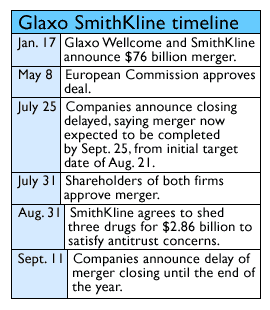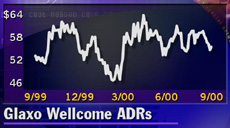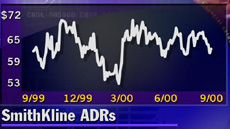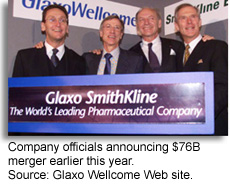|
Glaxo, SmithKline woes
|
 |
September 13, 2000: 3:01 p.m. ET
Drug firm, facing another deal delay, has a lot to prove with megamerger
By Staff Writer Martha Slud
|
NEW YORK (CNNfn) - It's been a rocky road toward the formation of the world's largest drug company.
British pharmaceutical companies Glaxo Wellcome PLC and SmithKline Beecham PLC are eager to consummate their marriage, a betrothal announced eight months ago amid a matchmaking frenzy in the pharmaceutical industry. But after initially announcing that the deal should be complete by the end of September, U.S. regulatory scrutiny of the deal has forced the companies to push back the target date until the end of the year.
The delay is the latest piece of bad news for the two companies, which have their work cut out for them to prove they can deliver on planned cost cuts and expanded product development from the $76 billion deal.
 "It's a distraction of management's time and probably just heightens the level of anxiety at both companies," said Corey Davis, a pharmaceutical analyst at Chase H&Q. "It's a distraction of management's time and probably just heightens the level of anxiety at both companies," said Corey Davis, a pharmaceutical analyst at Chase H&Q.
"The idea for putting the two companies together was to create a powerhouse," he said. "Increasing the amount of time to put the companies together postpones that."
Analysts also say the delays likely won't help ease the difficult transition from two cross-town competitors to one smoothly running entity.
On Jan. 17, two years after earlier talks were called off between Glaxo and the smaller SmithKline because of management conflicts, Glaxo announced that it planned to buy SmithKline.
"You just can't put aside that these companies have been rivals for many years," said Mara Goldstein, a drug industry analyst at CIBC World Markets. "At some point, you will get a stronger entity than either company is on its own, but execution is key."
The companies have said they remain "totally committed" to the deal, and analysts say the closing delays do not signal that the merger is in trouble.
Neither stock reacted much to Monday's postponement news. But the stocks have gyrated wildly this year, sinking after the deal was announced then recovering markedly in the subsequent months before retreating again. On the American depositary receipt market, both Glaxo and SmithKline ADRs today are little changed from where they were at the beginning of the year.
That compares with a 26 percent gain during the same period for shares of Pfizer Inc. (PFE: Research, Estimates), now the world's biggest drug company after its acquisition of Warner-Lambert Co., and a 57 percent jump for Pharmacia Corp. (PHA: Research, Estimates), the company created by the merger of Pharmacia & Upjohn and Monsanto Co. Both of those deals closed much faster than the Glaxo-SmithKline pact.
Up in smoke?
To satisfy regulators, SmithKline Beecham agreed late last month to shed three overlapping products -- selling the rights to chemotherapy drug Kytril to Roche Holding AG for $1.23 billion, and antivirals Famvir and Vectavir/Denavir to Novartis AG for $1.63 billion.
 But that apparently wasn't enough to appease antitrust concerns. The FTC wants additional information about the companies' anti-smoking products, concerned that the combined firm would dominate both the prescription and over-the-counter market. But that apparently wasn't enough to appease antitrust concerns. The FTC wants additional information about the companies' anti-smoking products, concerned that the combined firm would dominate both the prescription and over-the-counter market.
Glaxo makes Zyban, a prescription-only stop-smoking pill, while SmithKline Beecham manufactures the over-the-counter products Nicorette gum and the Nicoderm patch.
Davis said that if necessary, Glaxo and SmithKline can simply divest some of the smoking cessation products, which account for only a paltry amount of the companies' total revenues. Glaxo's Zyban, for instance, has about $160 million in sales, compared with a combined $25 billion in annual revenue for the two companies.
The merger was initially slated to close Aug. 21, but last month was rescheduled for Sept. 25. Analysts say the repeated delays reflect U.S. officials' increased wariness of mega-mergers -- ranging from the recent BP Amoco (BP: Research, Estimates)-Atlantic Richfield oil deal to the pending marriage of America Online Inc. (AOL: Research, Estimates) and Time Warner Inc. (TWX: Research, Estimates), which is the parent of CNNfn.
"The FTC is taking a much harder look at mergers in general," said Linda Varoli, an analyst at Merger Insight.
 Regulatory review of pharmaceutical mergers differs from deals in many other sectors because the industry is so fragmented. The combined Glaxo SmithKline is expected to lead the industry with only about 7 percent market share worldwide. Regulatory review of pharmaceutical mergers differs from deals in many other sectors because the industry is so fragmented. The combined Glaxo SmithKline is expected to lead the industry with only about 7 percent market share worldwide.
Thus, regulators focus on specific medicines to see whether companies will dominate any one market. It isn't enough anymore for merger partners to announce they plan to shed overlapping products, Varoli said. She said U.S. regulators, more so than their European counterparts, want to be sure that the divestitures will result in true competition in the marketplace.
Product woes
Whenever the deal closes, the new Glaxo SmithKline will have a lot to prove to investors. Glaxo is especially under pressure, after several product rollouts this year have been less than overwhelming, notes CIBC's Goldstein. The launches come at a time when the company is still rebounding from the 1997 loss of patent exclusivity for its blockbuster ulcer drug Zantac. The introduction of cheaper, generic competition led to millions in lost revenue for the company.
 Glaxo's Lotronex, a highly touted medication for women with irritable bowel syndrome, has registered disappointing sales amid concerns over serious intestinal side effects. The drug has good potential, but likely will need aggressive consumer marketing to banish its negative image, Davis said. Glaxo's Lotronex, a highly touted medication for women with irritable bowel syndrome, has registered disappointing sales amid concerns over serious intestinal side effects. The drug has good potential, but likely will need aggressive consumer marketing to banish its negative image, Davis said.
Sales of Glaxo's new flu drug Relenza also have been lower than expected. The inhaled drug is battling with Roche's Tamiflu, a pill version that's considered easier to use. Glaxo, however, says an inhaled flu drug is more effective.
"Glaxo Wellcome has been able to get a number of products out the door, but none of them has really had the oomph that they needed," Goldstein said.
With its product troubles, Glaxo is looking forward to gaining control of SmithKline's popular antidepressant Paxil, as well as diabetes treatment Avandia.
Davis also pointed to good prospects for Glaxo's new respiratory drug Seretide, a combination treatment made up of two other Glaxo drugs. The drug racked up $127 million in sales in the first half of the year in Europe and is expected to be launched later this year in the United States under the name Advair.
"That, in my mind, will be the biggest respiratory drug of all time," Davis said. 
|
|
|
|
|
 |

|

